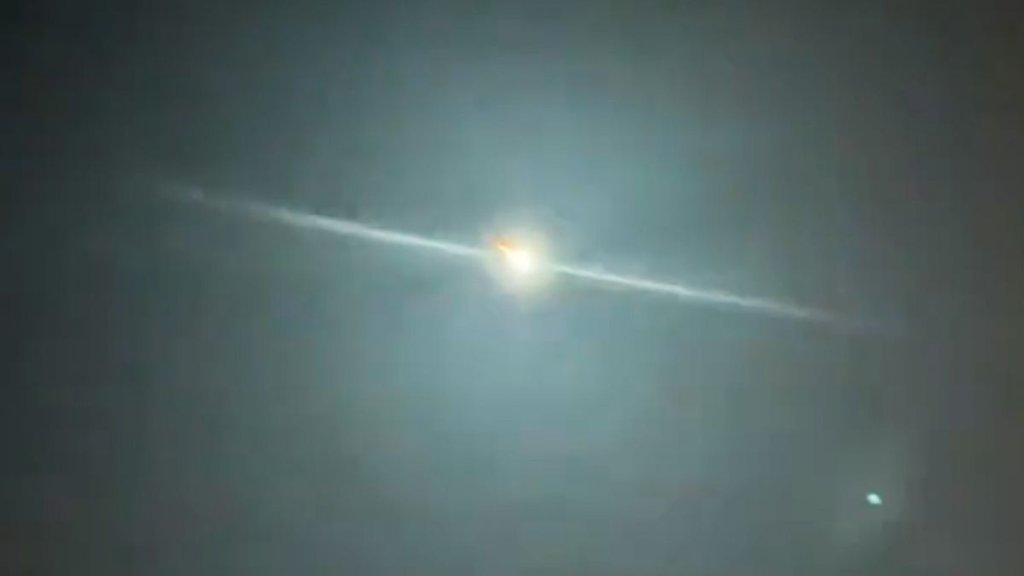A cosmic find lit up the search of a meteorite-hunting citizen science project.
Volunteers searching north of Rouen, France near the northern coast spotted a meteorite from fireball event 2023 CX1.
The space rock originated with a small asteroid that burned up dramatically over Europe around 10 p.m. EST Sunday, Feb. 12 (0300 GMT Monday, Feb. 13), just hours after astronomer Krisztián Sárneczky discovered it from a telescope in Poland.
Meteorite finder Loïs Leblanc is a student who is just 18 years old, volunteer group Vigie-Ciel (“Sky Lookout” is an approximate translation in English) wrote on Twitter (opens in new tab) on Wednesday (Feb. 15). Vigie-Ciel and an affiliated project, FRIPON, are space-focused citizen science efforts working with numerous French scientific institutions like the Paris Observatory and the University of Paris-Saclay.
Leblanc made the find after his attention was caught “by a dark stone barely level with the ground of a field, in the town of Saint-Pierre-le-Viger,” the group wrote in a blog post (opens in new tab). (Translation provided by Space.com). The team plans to scour the area, in concert with local residents, to look for more fragments, the post added.
Related: What are asteroids?
The meteorite, originating from a 3.2-foot (one-meter) meteoroid called SAR 2667, was discovered by Sárneczky at Konkoly Observatory’s Piszkéstető Station, located some 60 miles (100 kilometers) northeast from Budapest, with a 2-foot (0.6-meter) telescope.
Sárneczky was doing a routine hunt for near Earth objects, the astronomer told Space.com senior writer Tereza Pultarova in an e-mail Monday (Feb. 13). “It was immediately obvious that it was an NEO, but it wasn’t particularly fast across the sky, as it was heading right towards us, and it was faint,” Sárneczky added.
The find was the second time Sárneczky has spotted an asteroid just hours before it broke apart in Earth’s atmosphere as a fireball, following an incredible find in March 2022.
🤩☄️ FRIPON/Vigie-Ciel retrouve un fragment de l’astéroïde 2023CX1 en Seine Maritime !!! La découverte a été faite par Loïs Leblanc, étudiante de 18 ans, faisant partie de l’équipe de recherche sur le terrain #2023CX1 #SAR2667 pic.twitter.com/gQjp7OqzV0February 15, 2023
The event generated more than 70 reports after the early-morning (roughly 0300 GMT) fireball, in locations across the United Kingdom and on the European continent in locations like France, Belgium and the Netherlands, according to the American Meteor Society (opens in new tab).
The fireball coincidentally fell almost exactly 10 years after a six-story space rock unexpectedly exploded over Chelyabinsk, Russia on Feb. 15, 2013. That incident luckily only caused minor injuries and damage and was an exceedingly rare situation, as most meteorite falls are completely harmless.
Nevertheless, NASA, the European Space Agency (ESA) and numerous other entities recommitted to tracking objects in space to an even greater degree than telescopic searches at the time. For example, NASA opened a Planetary Defense Coordination Office in the wake of the event.
The detection of meteoroid SAR 2667 is only the seventh time astronomers spotted a space rock before it arrived at Earth, according to the European Space Agency. “It’s a sign of the rapid advances in global detection capabilities,” the agency wrote on Twitter (opens in new tab).
Editor’s Note: If you snapped a photo or video of the fireball and would like to share it with Space.com’s readers, send your photo(s), comments, and your name and location to spacephotos@space.com (opens in new tab).
Elizabeth Howell is the co-author of “Why Am I Taller (opens in new tab)?” (ECW Press, 2022; with Canadian astronaut Dave Williams), a book about space medicine. Follow her on Twitter @howellspace (opens in new tab). Follow us on Twitter @Spacedotcom (opens in new tab) or Facebook (opens in new tab).

